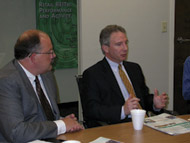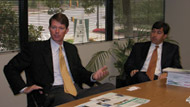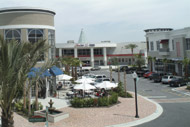|
COVER STORY, DECEMBER 2004
IN THE PATH OF GROWTH
Colonial Properties Trust expands its presence in the Southeast
and beyond.
Julie Fritz Hunt
When Southeast Real Estate Business (SREB) spoke with
executives from Birmingham, Alabama-based Colonial Properties
Trust 2 years ago, the company’s philosophy was to put
itself in the way of growth.
SREB sat down with the company again this fall and discovered
that all of the growth and changes the company has experienced
have not changed its philosophy.
 |
(left to right) Linda Geiss, Reynolds Thompson
and William Leitner III.
|
|
“The company is evolving, but our strategy is unchanged,”
says Reynolds Thompson, chief operating officer. “We’re
still a diversified real estate investment trust that has
an interest in multifamily, office and retail. However, our
geographic footprint has broadened somewhat in the last 2
years.”
There are 148 metropolitan statistical areas in the Sunbelt,
and Colonial has ranked them based on population, job and
income growth projected to occur over the next 5 years. “We’ve
taken the top 37 cities from that list,” Thompson explains.
“Our goal is to have 75 percent of our income coming
from investments in those cities through multifamily, office
or retail. Today, about 50 percent of our income comes from
those cities, so we need to make a pretty substantial change.
We’ve already made some significant headway toward that
this year with the acquisitions and developments that we’ve
got coming through the pipeline.”
 |
Colonial Pinnacle at Craft Farms, Gulf Shores,
Alabama.
|
|
The move will create a broader geographic diversification
for Colonial. The company currently is heavily concentrated
in Alabama, Florida and Georgia, and this will give Colonial
a bigger presence in the Carolinas, Texas and Arizona.
The company recently entered into a partnership with DRA to
acquire a total of 16 multifamily properties in Albuquerque,
New Mexico; Phoenix and Tucson, Arizona; and Las Vegas. Colonial
acquired a 20 percent interest in the partnership and will
handle the property leasing and management of more than 4,200
units.
“We’re trying to put ourselves in the way of the
growth, where population growth, job growth and incomes are
going to help our properties succeed,” says Thompson.
“A city like Orlando, Florida, is a good example of the
kind of presence we’d like to have in a dynamic, growing
city. We have all three of our operating divisions represented,
and we’re the largest suburban landlord in Orlando. We’ve
got over 5,000 apartment units and a very sizable retail portfolio
in Orlando. We’ve got that kind of presence in Birmingham,
but we’d like to have that kind of presence in Charlotte,
Texas and even further out West. Toward that end, we’ve
also brought a lot of new talent on board. These are a bunch
of young, energetic people who have a vision for what we want
our retail business to become in the years ahead.”
People Make the Difference
Colonial has hired a number of new executives recently, including
Chip Light, executive vice president, retail division; Brian
Neltner, senior vice president, retail division; and William
Leitner III, executive vice president, retail development
and acquisitions.
 |
Brian Neltner (left) and Chip Light.
|
|
The company also has doubled the size of its retail development
team in the last 18 months. In addition to Bryan Ratliff,
Paul Glascock and John Hughey, all of whom have 15-plus years
with Colonial, the company has added three senior vice presidents
of retail development in three major markets: Duke Sullivan
in Atlanta, Todd Hardin in Houston and Clint Connel in Austin,
Texas. “We want the retailers to think of themselves
as our partners: Where they go is where we’ll end up,”
Light explains.
“The group as a whole averages of 18 years of experience,
has long-standing tenant relationships and has extensive market
knowledge,” says Leitner. “We really feel like we
have a seasoned team in the company right now. We’ve
set up a decentralized strategy in various top-tier markets
and put these developers in a position where they are like
the owner of that franchise. They are all things retail development
for that market. It enhances and increases deal flow in all
respects.”
The company’s strong retail leasing team also has gotten
a boost from added talent with the addition of Ray Sankovich,
Dan Zoghby, Wade Robinett, Pat Kelly and Lanne Cort.
“When I started here last August, I was the SVP of leasing,”
says Light. “It was a good leasing staff, but we wanted
to add more depth. We brought in four or five seasoned professionals
that we consider senior statesman of the real estate industry
— they’ve had experience with Jacobs, Urban, Westfield,
Glimcher and CBL. We meshed those people with the people that
we already had on the ground, and it was a wonderful exchange
of ideas. We brought Brian in, and he’s taken it one
step further. Not only does he bring a strong leasing background,
but he adds a strong financial component as well.”
 |
Reynolds Thompson (left) and William Leitner
III.
|
|
“The leasing staff is leaning to a greater tendency
to be where the properties are to learn the markets, and to
understand not just the malls that we have but [also] properties
we don’t own that might be opportunities 2 or 3 years
down the road,” says Neltner.
Additionally, Colonial appointed a new chief financial and
investment officer, Weston Andress, last spring.
“Weston’s background is investment banking,”
says Thompson. “He has really accelerated our participation
in the deal flow and the different things that we’re
looking at, from joint ventures to larger transactions. He
is really going to help us try to grow the enterprise more
than we have over the last few years.”
Retail Pipeline
In January 2003, Colonial’s pipeline was almost 250,000
square feet. The company’s current pipeline tips the
scales at more than 2 million square feet.
“Our emphasis is on the open-air format, both in acquisitions
and development,” says Thompson. “We’re looking
for a diversified retail portfolio, [but] we want to weight
our portfolio toward open-air shopping centers. That includes
everything from grocery to power centers to lifestyle centers.
We’re working on all types of those projects today.”
New projects include Colonial Promenade at Alabaster, a 660,000-square-foot
power center in Alabaster, Alabama. Wal-Mart Supercenter,
Lowe’s Home Improvement Warehouse, Belk and AmStar Cinema
will anchor the project. “When it is completed, it will
be the largest shopping center in Shelby County, Alabama’s
fastest growing county,” says Leitner.
The largest development the company is working on right now
is Colonial Pinnacle at Turkey Creek in Knoxville, Tennessee,
a 76-acre development spanning 535,000 square feet. This high-end
lifestyle center will be anchored by Proffitt’s, an 18-screen
Regal Cinema and a grouping of the core concept lifestyle
fashion and home décor retailers. “Tenant demand
has allowed us to launch Phase II across the street,”
says Paul Glascock, developer for the company. “We’ll
bring in some power center-type retailers to round it out.”
In Gulf Shores, Alabama, Colonial is developing Colonial Pinnacle
at Craft Farms. Cobb Theatres, a traditional department store
and a high-end restaurant package will anchor this lifestyle
center development. The theater will open next June, and the
shopping component will open in 2006. “The Gulf Shores
market resembles Destin, Florida, 3 years ago,” says
Leitner. “The 4.5 million tourists who visit this market
have high levels of disposable income, evident by the fact
that the average condo price in Gulf Shores right now is $500,000.”
Colonial is underway with Colonial Pinnacle at Tutwiler Farm
in eastern Birmingham. One section of the project contains
price-sensitive big box retailers, behind which is a lifestyle
element. Light describes the lifestyle portion as an outdoor
mall. “It will have Belk, Best Buy and two traditional
department stores — the typical things you’d find
in a mall — and the tenants that are ancillary to those
stores. Our goal is to have everything that a mall and peripheral
retail offer in one package where it will be a little more
consumer-friendly. You can park right in front of the stores
and go in,” says Light.
Colonial prides itself on creating convenient, pedestrian-friendly,
village environments that are extensively landscaped.
“It’s not an asphalt jungle,” says Light. “We
want to give people an environment that they want to keep
coming back to.”
Retail Redevelopments
Retail redevelopments are a big part of Colonial’s portfolio.
Last month, the company hired Brian Jones as vice president
of redevelopment. He previously worked for Kimco Realty Corporation.
“[Jones is] very leasing- and financially oriented,”
says Neltner. “He’s trying to squeeze as much money
out of each one of these assets [as possible], to really create
better shopping environments in each one of them.”
The company redeveloped Beechwood Shopping Center in Athens,
Georgia. When Colonial purchased the shopping center, it housed
Harris Teeter, Stein Mart and some local shops.
“Through our very strong mall background, and the better
tenant relationships that we’ve had, we were able to
backfill that shopping center with a much better tenant mix,
including Ann Taylor, Chico’s and Talbots. It’s
been an absolute gem with great sales volumes — all due
to Colonial’s experience with the mall tenants,”
Neltner says.
“With our breadth of knowledge, we’re able to cross
those boundaries and bring strip tenants into malls,”
Light notes. “We’re also able to bring some of these
mall tenants into the lifestyle centers.”
Many of the properties Colonial works on today don’t
fall into one particular category.
“These properties don’t fall into pre-conceived
categories anymore,” says Thompson. “They’re
hybrids. At Brookwood Village in Birmingham, we’ve turned
the ground floor inside out. It now faces outside, and we
created outparcels for restaurants. Once you go inside and
upstairs, it’s a traditional mall. It clearly doesn’t
fall into a single category anymore. We’re also working
on a project right now in Birmingham that has lifestyle center
and power center tenants. It’s just a great location
and all the retailers wanted to be there.”
Office & Multifamily
Because it has expertise in the office, retail and multifamily
sectors, Colonial has the ability to allocate capital to each
sector as it demonstrates an opportunity for growth.
“In the late 1990s, we were as much as 60 percent multifamily,”
says Thompson. “Today we’re about 27 percent. Multifamily
concessions are starting to burn off, and we’re seeing
an improvement in economic occupancy. Because of that, we
believe it’s time to increase the investment that we
have in the multifamily sector. We believe that the multifamily
sector has some opportunity for internal growth in the future.
“Office is going to be very opportunistic for us,”
Thompson continues. “Office business is still very challenging.
We’re watching that market. It’s not unlike multifamily;
it’s going to turn around as well. It’s just a question
of timing.”
Colonial has made a few office acquisitions this year in markets
in which it already has a presence, and the company is looking
for opportunities in some of the growth cities it has identified.
“Pricing has been very aggressive and we just have not
found something that makes a lot of sense,” Thompson
explains. “One thing that we may try to do in the office
sector is to make some acquisitions through joint ventures.
That’s something we’ve done in multifamily and retail.”
Goals
Colonial’s overall goal is to be the star performer in
real estate, and each division’s goal ties back to this
corporate goal.
“We really have three constituents — shareholders,
merchants/residents/ office clients, and employees,”
says Thompson. Colonial is traded on New York Stock Exchange
as CLP. “We want to make sure we do what’s right
by each one of [our constituents]. At a time like this, when
we’re looking at shifting assets into multifamily, some
of these dollars that we’re creating in retail actually
may go back into multifamily. At the same time, we’re
also dedicating a tremendous amount of capital to our retail
development pipeline. We’re trying to weight our overall
business in a different way.”
The company also is interested in teaming with a developer
that is creating a master-planned neighborhood; Colonial could
provide the retail, multifamily or office component. “That’s
something that we think we’re well suited to do,”
says Thompson. “We understand that.”
| Project Update: Colonial
TownPark
Colonial TownPark was Colonial’s first endeavor to
create a development with all three property types. Last
year, the National Association of Industrial and Office
Properties made Colonial the national developer of the
year for the project.
 |
Colonial TownPark, Orlando, Florida.
|
|
Located north of Orlando off of Interstate 4 in Lake
Mary, Colonial TownPark is located at an interchange
that wasn’t even in place when Colonial purchased
the property.
“This was a fairly unique project in terms of its
size,” says Thompson. “There’s a total
of 1.5 million square feet of office space existing, and
we’ve got about 600,000 or 700,000 square feet of
office that could be developed.” The property also
contains a hotel; a town center with retail and apartments
integrated with a theater, grocery store and restaurants;
and a more traditional multifamily property. Colonial
has plans to add more multifamily and for-sale housing.
“It’s been an unbelievably successful formula,”
Thompson says. “The office tenants play great with
the retail; the retail works well with the multifamily.
And we’re still looking for any kind of opportunity
where we can find a piece of property that we can bring
multiple uses to.”
— Julie Fritz Hunt
|
©2004 France Publications, Inc. Duplication
or reproduction of this article not permitted without authorization
from France Publications, Inc. For information on reprints
of this article contact Barbara
Sherer at (630) 554-6054.
|
